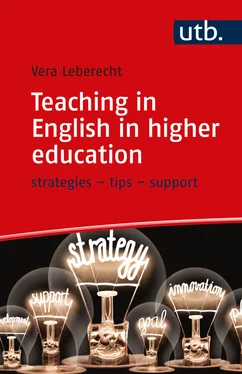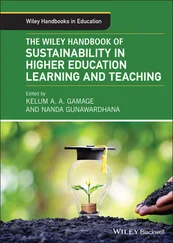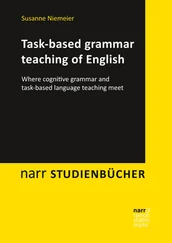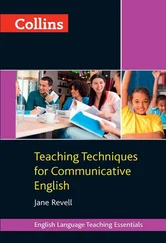Vera Zegers-Leberecht - Teaching in English in higher education
Здесь есть возможность читать онлайн «Vera Zegers-Leberecht - Teaching in English in higher education» — ознакомительный отрывок электронной книги совершенно бесплатно, а после прочтения отрывка купить полную версию. В некоторых случаях можно слушать аудио, скачать через торрент в формате fb2 и присутствует краткое содержание. Жанр: unrecognised, на английском языке. Описание произведения, (предисловие) а так же отзывы посетителей доступны на портале библиотеки ЛибКат.
- Название:Teaching in English in higher education
- Автор:
- Жанр:
- Год:неизвестен
- ISBN:нет данных
- Рейтинг книги:4 / 5. Голосов: 1
-
Избранное:Добавить в избранное
- Отзывы:
-
Ваша оценка:
- 80
- 1
- 2
- 3
- 4
- 5
Teaching in English in higher education: краткое содержание, описание и аннотация
Предлагаем к чтению аннотацию, описание, краткое содержание или предисловие (зависит от того, что написал сам автор книги «Teaching in English in higher education»). Если вы не нашли необходимую информацию о книге — напишите в комментариях, мы постараемся отыскать её.
Teaching in English in higher education — читать онлайн ознакомительный отрывок
Ниже представлен текст книги, разбитый по страницам. Система сохранения места последней прочитанной страницы, позволяет с удобством читать онлайн бесплатно книгу «Teaching in English in higher education», без необходимости каждый раз заново искать на чём Вы остановились. Поставьте закладку, и сможете в любой момент перейти на страницу, на которой закончили чтение.
Интервал:
Закладка:
No, this does not happen overnight – or within a one-day workshop. But there is no magic about it either. It just takes some time and focused effort because you already know how to do it. You just need to do it. Here are some ideas, or reminders, how you could approach this (with thanks to numerous colleagues and former workshop participants):
Read English textbooks, books, papers, journal articles, and professional blogs on your subject. The trick here is to “take off your content glasses” and to “put on your language glasses” every now and then; with that, I mean that you focus on language and style rather than content, and that you pay attention to familiar and new words that you could use in your own teaching. Maybe you even want to take notes. Decide how you profit most from this kind of professional reading.
Search for online and offline dictionaries, glossaries, and databases on your subject. They are invaluable (which, somehow paradoxically for non-English speakers, means very valuable!) sources of professional development for English-medium teachers.
Watch videos on your subject: Many universities in the Anglo-Saxon world provide online lectures and training courses. When these courses are aimed at students, you can use them as examples of how first-language speakers of English present their contents. The courses aimed at instructors might provide useful tips on good lecturing in addition to the subject terminology.
Attend international conferences and proactively use them as stages for presenting your research. Expand your small-talk competences in coffee breaks and at conference dinners, and you might come home with a new English joke or two in your repertoire …
Start writing your own blog, or look for opportunities to contribute to existing blogs as a guest writer. This is a good way to practise reaching out to students, fellow researchers, and interested readers in the general public.
What about setting up international cooperations, working groups, or research projects at your university, or breathing new life into a collaboration or project that has been fading away in a remote corner of your department for a while? Maybe a cooperation with a company or research department in another part of the world would be a logical spin-off from one of your culturally diverse classes with Erasmus students or other international students? Or could you benefit from the professional contacts of a visiting or guest lecturer? The fact that English is used in workplaces all over the world opens doors to many regions where people are used to communicating in English and are eager to cooperate internationally. Many smaller countries, e.g., the Benelux and Scandinavian countries, have long traditions of using English and are often able and willing to liaise with interested individuals or institutions. The German Academic Exchange Service (Deutscher Akademischer Austauschdienst, DAAD) provides information on opportunities for individual and institutional cooperation ( www.daad.de/hochschulen/de/(in German; last accessed on 22 August 2019). Inspiration for and information on specific international cooperations can be found on many universities’ websites.
If you are looking for something that requires less commitment than setting up a complete cooperation programme and pays off in the short term, you could involve your students in a brainstorming session to explore which strategies would be useful to expand both your own and your students’ active terminology. Who said that you are solely responsible for vocabulary/terminology development in your class? What about joining forces to create a glossary? When you emphasise that students are responsible for developing their command of subject terminology, you may also raise their awareness for ensuring that everybody in class uses the terminology accurately and consistently. Maybe creating a glossary, or contributing to it, could even be a part of the grade your students receive?
Finally, become a networker: Share your experiences, be they pleasant or awful, and interview colleagues who are a few steps ahead of you on the path of English-medium teaching about their failures and successes. Find out which strategies have worked for them, and be open for activities and approaches that may not have worked for others but might be just right for you.
Whatever you decide to do to develop your subject terminology, make sure you start soon and take steps – big or small – regularly.
Time for reflection:
What can I do to expand my English subject terminology?
Which practical steps can I take by the end of this week to get me going?
Please allow me one final remark here: Yes, expanding your subject terminology takes time. But remember, whatever language you decide to learn takes time. And, in a way, the terminology of your field of research is yet another language. To master it, most of us will have to make an effort, and need to practise. But this experience can bring us closer to our students who are usually facing not only this single challenge, but a whole load of them: They do not just have to learn some new English words but also come to grips with the principles, methods, theories, models, contents, and researcher identities these words represent! So regardless of the language in which you share your subject with students, never forget that you are the expert! Your students are usually aware of that and perceive you as exactly that: the expert. It might feel awkward to have students in your class whose general English language skills are much better than yours because they were born in Canterbury, Connecticut, or Canada, or have recently returned from an exchange year in Northern Ireland. But remember: You are the one in the room who knows much more about fluid dynamics, the autopoietic reproduction of social systems, or robotics than they do – and that is exactly why they attend your class.
2.2 General English language skills
While it is essential for English-medium teachers to know their subject terminology, terminology alone will not help you to make it through a 90-minute lecture or seminar – and to keep your students from dozing off or running away. You will need a certain level of fluency in what is usually referred to as general language, too.
I sometimes talk to lecturers who are experts in their fields of research and have accumulated many years of teaching experience but are still insecure about switching to English-medium instruction. They usually state that they feel restricted in their use of humour or idiomatic expressions when they switch to English; this, they say, prevents them from expressing themselves authentically and invitingly. This always reminds me of a colleague who one day decided to make real work of his use of humour in his English-medium course. He started spending some of his preparation time on thinking about, or even actively searching for at least one joke, one humourous remark or one metaphor; he would look up the correct English wording, and put down in his notes where exactly he would use it. Usually, he learnt the joke by heart; sometimes, he included the exact wording in his notes. Before you frown on such tedious work that must kill each sparkle of spontaneity, I would like to remind you that many experienced professional speakers who give enthralling presentations do this all the time – and, of course, actors and comedians spend a lot of their time off stage doing the same. Even though they may seem to be extremely spontaneous, full of ideas, and totally relaxed sputtering out all those funny ideas coming to their minds at that very moment, all these professionals are far from leaving that to chance. In particular, most speakers to whom every word seems to come so naturally, spend many hours on rehearsing their performances. There is nothing despicable about practising how to start or finish a lecture in a foreign language. It might make you feel a bit – or more than a bit – like being an absolute beginner again, and most of us do not enjoy that feeling. However, when you switch to English as a medium of teaching, in a sense, you are a beginner again. Letting go of unrealistic expectations and giving yourself the time to learn and adapt can be a relief. As you work on enhancing your general English language skills, you might find that you profit from strategies, competences, and contents that go beyond your academic research interests. Here are a few suggestions; get inspired and go along with what works best for you:
Читать дальшеИнтервал:
Закладка:
Похожие книги на «Teaching in English in higher education»
Представляем Вашему вниманию похожие книги на «Teaching in English in higher education» списком для выбора. Мы отобрали схожую по названию и смыслу литературу в надежде предоставить читателям больше вариантов отыскать новые, интересные, ещё непрочитанные произведения.
Обсуждение, отзывы о книге «Teaching in English in higher education» и просто собственные мнения читателей. Оставьте ваши комментарии, напишите, что Вы думаете о произведении, его смысле или главных героях. Укажите что конкретно понравилось, а что нет, и почему Вы так считаете.












